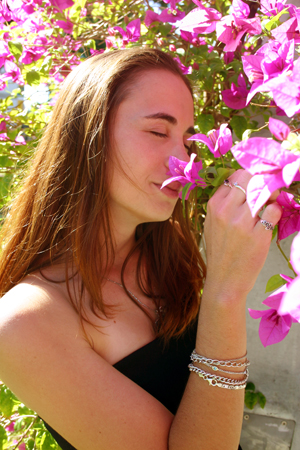
Effects of bio-identical hormones on the body Because they are identical in structure to our own sex hormones, the action of natural hormones is relatively gentle and effective.
by Dr. Sima Aidun —
Bio-identical hormones are made from plants — estrogen from soy and progesterone from wild yam. They are identical to the chemical structure of the hormones produced by the human body. Bio-identical hormones are the closest in chemical structure, actions and interaction to those hormones produced by humans.
Effects of bio-identical hormones on the body
Because they are identical in structure to our own sex hormones, the action of natural hormones is relatively gentle and effective. Bio-identical hormones attach themselves to human cell receptors, which are areas on the cell membrane that specifically recognize the substances they need to maintain the body’s health. Estrogen and progesterone receptors recognize these hormones as their own.
As women age, symptoms of hormonal imbalances occur because of a deficiency or lack of hormones in our bodies after menopause. Correcting the imbalance and resolving the symptoms requires supplementation.
In our bodies, natural hormones act to directly target the root cause of hormone deficiency symptoms. Because they come from plants and are identical to our bodies’ natural hormones, they don’t compete with human hormones. They supplement the action of human hormones, but don’t displace or replace our own hormones from action sites (receptors) on our cells. They are read by the human body as part of its own.
Administered in a medically supervised manner, bio-identical hormones can effectively treat the root cause of hormone imbalances, deficiencies and their attendant symptoms.
The body contains three different, dominant estrogens: estriol (E3), estradiol (E2) and estrone (E1). Estriol (E3) is not available as a patented product, and all formulations of it require a prescription to be filled by a compounding pharmacist who makes all bio-identical hormone replacement therapy formulations. Estradiol (E2) is the principal estrogen secreted by the ovaries during our reproductive years. Estrone (E1) is the main estrogen produced in menopausal women. The adrenal glands sit above our kidneys and produce androngens (male hormones like testosterone), which can be converted to estrone in fat cells.
One of the believed preferences of estriol over estradiol and estrone is that it appears to have both pro- and anti-estrogenic effects. When estriol is used alone, it generally exerts an estrogenic effect. The strength of this estrogenic effect depends on the dosage. When given in combination with estradiol or estrone, it appears to exert an anti-estrogenic effect. Some of the perceived advantages of natural estrogens have to do with combining the estradiol and estrone with estriol.
Bio-identical hormones can be formulated either together or alone, with progesterone, testosterone and even DHEA. The combinations, strengths and variability in formulation make this type of treatment individualized for every patient. This tailor-made nature, according to the intensity and type of each woman’s symptoms and levels of hormones in her blood, ensure the lowest dosage possible to address that patient’s specific symptoms.
The distinction between natural estrogens and conventional hormones is that those less friendly estrogens contain hormones, additives, binders and preservatives that are foreign to the environment of the human body. Whether taken from the urine of pregnant mares or a synthetic estrogen, they are not bio-identical to human estrogen.
Natural estrogens are preferred over the patented, but less friendly, conventional HRT because of some unique characteristics of estriol, a greater ability to vary dosing and formulation, and a desire for purity. It is important to acknowledge that the preference for a bio-identical hormone over a foreign hormone is largely theoretical, at this point, but theory is the foundation of science. As of yet, there have been no long-term studies on the long-term safety of bio-identical hormone replacement therapy.
Natural progesterone
The term progesterone is sometimes mistakenly used to describe the synthetic analogue, progestin, which often is used as a medicinal or cosmetic agent. In order to better understand the different hormone products, it is important to make a distinction between progesterone, progestin and progestogen.
Progesterone is a natural hormone produced by a woman’s body. Progestin is the synthetic derivative, which differs in biochemical structure from progesterone, a term applied to any substance promoting progestinal activity. Progestins, the synthetic form of progesterone used in conventional hormone replacement therapy and birth control pills, often cause irritability, depression, bloating, swelling and mood swings.
Progesterone has many functions in the body, including its role as an anti-estrogen, normalizing water balance, as a precursor to the development of other hormones, as an aid in thyroid function and blood sugar metabolism.
As a medicinal agent, progesterone has many uses, including the treatment of PMS, preterm labor, recurrent miscarriage, irregular menses and fibrocystic breasts. In menopause, progesterone can be used to relieve many symptoms and to balance the effects of estrogen on the uterus. It is important to emphasize that if you are peri- or postmenopausal, with an intact uterus and taking any kind of estrogen, you must take a proven form and dosage of progesterone. Some physicians prefer adding the progesterone into the estrogen compound, so they know the exact dosing to achieve the protective and therapeutic effect.
Physicians take multiple factors into consideration when formulating bio-identical hormones: type of symptoms, severity of symptoms, blood level before the treatment, body weight and bone density results. All of these factors allow them to determine the proper concentration to achieve the best results. Bio-identical formulas come in different formats: capsule, cream and lozenge, with lozenge being the most effective, since it is directly absorbed into the blood.
Dr. Sima Aidun is a naturopathic medical doctor focusing on women’s healthcare with an emphasis on bio-identical hormones, clinical nutrition, acupuncture and botanical medicine. 480-281-1462 or draidun@cox.net.
Reprinted from AzNetNews, Volume 25, Number 4, August/September 2006.





December 24, 2012
Depression, Estrogen, Health, Hormone replacement, Men, Natural medicine and Natural Therapies, Sex, Thyroidism, Women